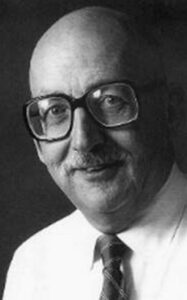January 29, 2018

Steve Riley
Veteran Maine newspaper editor A. Stephen “Steve” Riley died this month at his home in Meredith, New Hampshire. Riley, whose career at the Portland Press Herald and Maine Sunday Telegram spanned 30 years, was 90 years old. His family said his health had been declining.
Riley, who lived in Cumberland Foreside’s Wildwood neighborhood for more than 50 years, spent nearly all of his adult years working as a journalist, rising up from the reporting ranks to become managing editor of the Press Herald and Sunday Telegram.
In the mid-1980s, he left the Press Herald to become editor of the Central Maine Morning Sentinel in Waterville. He remained there until his retirement in 1990.
Riley was a decorated journalist. In 1989, he was named Maine Journalist of the Year by the Maine Press Association and in 1994 he received the prestigious Yankee Quill Award from the New England Society of Newspaper Editors, or NESNE. The Yankee Quill Award recognizes a lifetime spent achieving excellence in journalism in New England. In addition to those honors, Riley was inducted into the Maine Press Association Hall of Fame in 2005.
“My father always wanted to be a reporter,” said his son, Stephen W. Riley of Vienna, Virginia, a foreign service officer for the U.S. State Department. “He had this innate sense of curiosity.”
“His interest in journalism wasn’t as grandiose as making the world a better place, but more that he liked keeping people informed,” his son explained in a telephone interview Sunday.
After graduating from the University of Maine in 1950, Riley started working for the Brunswick Record and later the Portsmouth (N.H.) Herald, where he covered news in York County.
He then worked briefly for the former Bangor Commercial newspaper before joining the news staff of the Press Herald as its Bangor correspondent.
He spent the rest of his career with the former Guy Gannett newspapers, eventually transferring to Portland, where he became a feature writer for the Maine Sunday Telegram.
Riley remained active in New England journalism and served one year as president of NESNE. In the 1980s, during the Cold War with the Soviet Union, Riley participated in an exchange program with Soviet journalists.
He was a member of NESNE delegations that traveled to the U.S.S.R., and NESNE hosted Soviet journalists in New England four times.
“He found that exchange quite rewarding and fascinating,” his son said. “He took great pride because he felt it opened the eyes of Soviet journalists.”
Bill Nemitz, a columnist for the Press Herald and Sunday Telegram, said that if it weren’t for Riley, he may not have wound up writing for the Portland newspapers.
Nemitz recalled he had been working as a reporter for the Morning Sentinel when he interviewed for a job with the Press Herald.
“I didn’t get the job. I was devastated,” Nemitz said.
But two days later, Riley got back to him with an offer Nemitz could not refuse – working as a reporter for the former Evening Express in Portland.
“Steve was an old-school editor, who loved the news,” Nemitz recalled Sunday. “Nothing excited him more than a good news story.”
Nemitz said Riley was more interested in helping other journalists succeed than in his own success. “It was always about the newspaper, not about him,” Nemitz added.
During a November 1990 presentation at a Maine Press Association conference, Riley offered some possible reasons for reader malaise.
“Could it be that we’re putting out papers that please us as editors and reporters but which, in many ways, do not serve the readers’ needs?” Riley said.
“Our product has been jazzed up. Sizzle has been added, but what about substance? I’m talking about news, not features, but real hard news.”
Riley’s son said his father will be remembered as a “tough but fair editor.”
“He always took the straight-down-the-middle approach. He’d tell me that if he had people on both sides of an issue mad at him, then he was doing his job,” his son said.
Riley felt strongly that the best reporting focused on issues that affect people and that stories should have substance.
He tried to mentor young reporters and managed his staff with aplomb.
“He was not a yeller or a screamer,” his son said. “He got his point across, but he did it in a very benevolent way.”
Riley moved to New Hampshire in 2010 to be closer to his daughter, Beth Mattson of Bristol, New Hampshire.
The family held a private service in early January for Riley, who died Jan. 7 at his home in Meredith.

